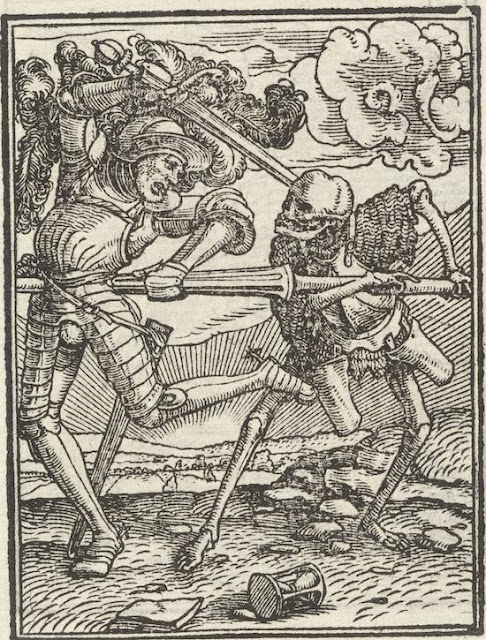This Bastionland Editorial was originally sent as a reward to all Patreon supporters, and is released freely on this site a week after its original publication.
If you want to support my blog, podcasts, and video content then head over to my Patreon.
-----------------------------
Into the Odd, and especially Electric Bastionland,
hold personal wealth in high regard. Your debt looms over you, and you're
explicitly told to go and hunt treasure to get rich quick. Buying fancier
weapons and armour is one of the main ways to improve your survivability, and I
wrote the Luxuries section of the equipment list to tempt players into
increasingly avaricious ventures.
Playing around with a more mythic-medievally-thing
on the same chassis has made me rethink the position of money. Not quite one of
those barter systems where people trade rabbits for halberds, but definitely
something that would force players to take on a different relationship with
money. That is to say I wanted to get rid of it.
As a side note, I want to put some weight on the mythic part
of my description above. I love exploring medieval history, but sometimes the
legends are even more interesting than the truth. Take Le Mort d'Arthur.
It's a book published in the 15th Century, set around the 5th Century, drawing
on stories originating from anywhere in between those points. That's before you
even get into the various cultures that have thrown their own twists into the
tale. Sub-Romain Britain is fascinating, but Arthurian Britain is enthralling.
So what value would this sort of world put on a longsword?
You'd better track down a fine blacksmith, there's no call for such an artisan
in this sleepy village, so off to a distant castle. Perhaps their liege already
has them busy with work, so why should they make a sword for you? Do you try to
appease the liege, or strongarm the smith? Maybe you're better off finding a
barrow mound rumoured to hold the fine arms from a long-dead warlord.
You don't just go to the shop.
I need to work on this guidance, but I have the seeds of a
procedure in place and, for now at least, have removed all references to
monetary valuations.
TRADE Only the rich deal in coins. Most
trade in this primeval land is focused on:
- Finding
somebody who can supply the item or service.
- Making
sure they have what they need to provide it.
- Providing
them with one of their needs or wants, or making a firm or implied promise.
The value of any given item depends entirely on the
bargaining positions of the person holding it, and the person desiring it.
Long-standing trade agreements often form into pledges of ongoing service or
protection.
Naturally, more effective arms and luxurious goods are
more difficult to find in supply, and demand more in return.
COMMON ARMS
Crude Weapon: d6 bulky,
pitchfork, staff, etc.
Blade: 2d4, dagger, dirk, etc.
Hand Weapon: d6, axe,
spear, etc.
Field Weapon: d8 bulky, pike, bill, etc.
Niche Weapon: d6, bulky,
+d8 in a specific situation, torniehook, thistlepole, etc.
Javelin: d6
ranged
Bow: d6 bulky, ranged
Light Shield: +1 Armour in melee
Heavy Shield: +1
Armour, bulky
Field Armour: Armour 1, bulky
RARE ARMS
Hefty Weapon: d8, waraxe,
morningstar, etc
Longsword: 2d6
Greatsword: 2d8 bulky
Greatbow: d8 bulky,
ranged
Kite Shield: +1 Armour
Fitted Armour: Armour 1
Note: Weapons listing multiple dice roll and keep the
single highest die.





